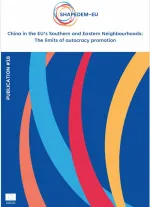China in the EU’s Southern and Eastern Neighbourhoods: The limits of autocracy promotion

This working paper examines China's role in political developments across the EU's Southern and Eastern Neighbourhoods between 2010 and 2024, assessing whether Beijing has contributed to processes of democratisation or authoritarianisation. Through detailed analysis of four cases in the Southern Neighbourhood affected by the 2011 Arab uprisings (Tunisia, Egypt, Libya, and Syria) and three cases in the Eastern Neighbourhood (Ukraine, Belarus, and Georgia), two of them linked to the Colour Revolutions, we challenge prevailing assumptions about China as a systematic promoter of autocracy. Instead, we find that China adopts a pragmatic, case-by case approach to political developments, prioritising stability and continuity over ideological alignment. China's primary tools—official discourse, UN Security Council veto power, and economic engagement—serve to protect commercial interests, international status, and geopolitical considerations rather than to explicitly advance authoritarian agendas. While Beijing has provided discursive support to both democratic transitions and authoritarian consolidation, accommodating whichever political trajectory emerges, substantial material support for autocratic survival remains limited. Syria’s civil war represents the main exception, where China's UN vetoes constituted a significant example of autocracy support, though this was motivated by broader sovereignty concerns and regime change precedents rather than specific support for the al-Assad regime. The study concludes that China's primary challenge to democratisation efforts lies not in active autocracy promotion, but in legitimising authoritarian alternatives through its development model and contesting liberal democratic norms within international discourse.